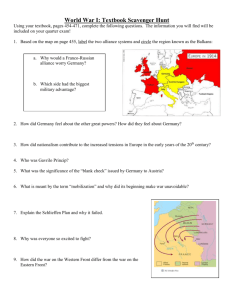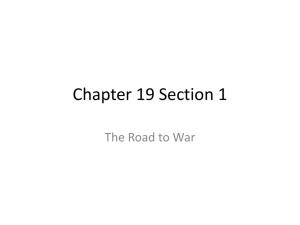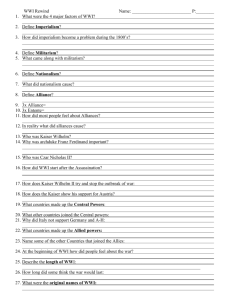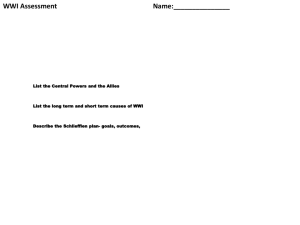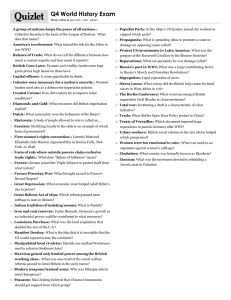Semester Exam Study Guide - wswildcats
advertisement
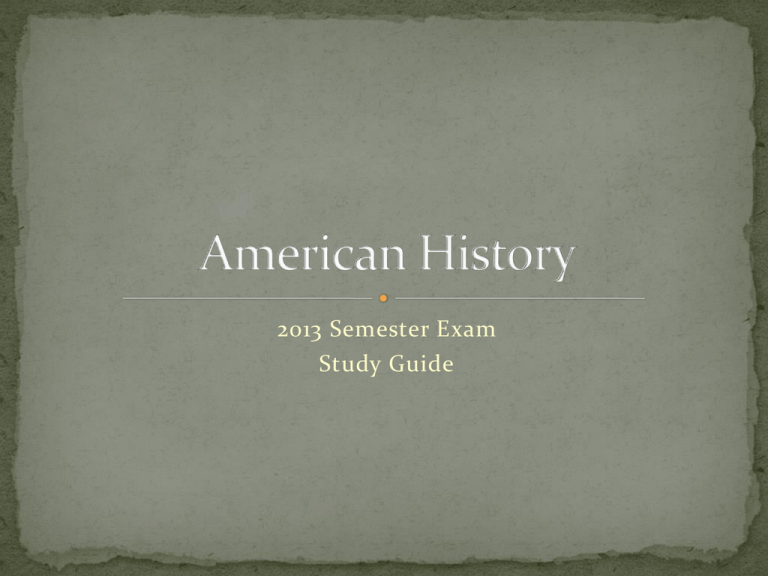
2013 Semester Exam Study Guide 30 years old Citizen for 9 years Resident of the state you are representing 6 years 25 years old Citizen for 7 years Resident of the state you are representing 2 years 35 years old Natural born U.S. citizen 4 years 2 term limit Separation of power among three branches of government Checks and balances U.S. Constitution Rationalism – our ability to reason Rene Descartes Federal government was not strong enough to tax or deal with national problems The government should not be involved in economic matters – “hands off” or laissez-faire economics Maintain an army – protect citizens from invasion Maintain a police force – protect citizens from injustice Maintain public works & infrastructure to facilitate economic activity To protect citizens’ individual liberties and freedoms from the Federal government life To ensure one branch of the federal government does not gain too much power Rights all humans are born with Life, liberty, pursuit of happiness To defend and protect citizens’ natural rights Alter or abolish their government Thomas Jefferson All men are created equal All men have natural rights Checks & balances Bill of Rights Citizens elect people to represent their interests 9 justices Appointed by the President & approved by the Senate 1st: freedom of religion, speech, press, assembly 2nd: the right to bear arms 3rd: no quartering of troops! 4th: protection against unreasonable search & seizure 5th: protects against self incrimination, double jeopardy, guarantees a grand jury for serious federal offenses, and ensures the govt must pay a fair price for taking private property 6th: Speedy and fair trial 7th: Right to a trial by a jury of peers 8th: Protection against cruel and unusual punishment 9th: People have rights beyond those stated in the Constitution 10th: Powers not guaranteed to the federal government are held by the states and their citizens Concurrent Powers: powers shared by federal and state governments Enumerated Powers: powers specifically given to the federal government Reserved Powers: powers of state governments Federalism: a system of government where power is shared between federal & state govt’s Monopolies Trusts Cartels Provided a large pool of available labor Provided CHEAP labor Lack of sanitation Insufficient fire departments Riots/violence/crime Overpopulation Disease Tenement life Sherman Anti-Trust Act, 1890 Telegraph Telephone The gap between the rich and the poor grew even wider – rich get richer, poor get poorer Horizontal consolidation Formed the Standard Oil Trust From the owners perspective, they were paid less which kept production costs low Families also needed the money to help provided the basic necessities of life Andrew Carnegie People should be free to create as much wealth as they can, but when they have ensured their businesses sustainability & families security the rest should be given back for the public good. Management & ownership….everyone but the workers! Formed the Standard Oil trust Horizontal consolidation As production increased, cost decreased “Survival of the fittest” Darwin’s theory of evolution applied to society Those who are most fit to lead will rise to the top, those who are not will sink to the lower classes Because it was justification for their position in society Cruel business tactics Cheated people to increase their wealth Looting America’s natural resources Exploited their workers – low pay, long hours, dangerous conditions Bribed government officials to interpret laws/pass laws in their favor Someone who starts their own business – assumes the personal and financial risks of owning and operating a business Supply and demand As little a role as possible Sold the land given to them by the Federal government via land grants Steel Gaining control of all of the businesses that make up all phases of a product’s development Cheap and efficient mass production of steel Urban areas grew rapidly as people moved from rural areas to find jobs To negotiate better hours, wages, and a safe working environment To speak collectively as workers with one voice Their labor Decreased demand for skilled labor Public perception of organized labor Attitudes of ownership & the government towards workers and unions Social Darwinism No laws specifically legalizing the existence of unions or their practices Terrible working conditions Repeated wage cuts That unions led to violence, bloodshed, and anarchy Do whatever was necessary to resume production Industrial Union: a union representing all laborers, skilled and unskilled, in a given industry Craft Union: a union representing only skilled workers Scab: a negative term for a worker brought in to replace striking workers Injunction: A court order prohibiting a certain activity, or ordering an activity to stop, as in a strike Collective Bargaining: the process by which workers negotiate the terms of their employment with management/ownership Trust: A group of separate companies from the same industry that are brought together under the control of the same managing board Monopoly: One firm having complete control of a product or service Cartel: a loose association of businesses within a given industry that agree to regulate price and supply to ensure everyone profits Economies of Scale: the phenomenon that as production increases, the cost of each item produced is lowered To stabilize and regulate the nation’s banking system to prevent depressions and panics Regulate interest rates and the amount of money in circulation (money supply) Clayton Anti Trust Act, 1916 Specifically listed illegal practices of big businesses Created the Federal Trade Commission to enforce the law Legalized labor unions and their main practices Strikes Boycotts Peaceful picketing African Americans Bull Moose Party To investigate business practices and order companies to “cease and desist” any activities forbidden by the Clayton Act or face disciplinary measures Council-Manager system Recall Split of the Republican party Candidacy of Theodore Roosevelt on the Progressive ticket He ran on a platform of lowering tariffs and the initial bill did this, however the final version also included an increase in tariff rates The industrial working class/urban residents Uncovered the evils of America’s industrial society and exposed them to the public through publication of articles, books, photographs, etc. 17th Amendment Direct election of U.S. Senators by the citizens of their state He believed the conservation of America’s natural resources was the job of everyone and crucial to the future prosperity of the nation The government has an increased presence in the everyday lives of its citizens Passage of the Meat Inspection Act and the Pure Food and Drug Act The FED (Federal Reserve System) To get rid of harmful business practices that were restricting commerce and competition Suffrage – the right to vote! City Manager Initiative A program designed to ensure citizens basic needs are met and to ensure a minimum standard of living for all citizens Welfare Unemployment benefits Worker’s compensation Referendum Ida Tarbell Gave the ICC the power to regulate telephone and telegraph rates He was adamantly anti-conservation, but appointed to a position where his job was to manage the country’s natural resources Plessey vs. Ferguson Socialists wanted to completely overhaul the capitalist system; progressives wanted to keep capitalism but reform the problems that had grown out of rapid industrialization The role women played on the home front and abroad during World War I Susan B. Anthony: Congressional Union: More militant and aggressive women’s suffrage organization founded by Alice Paul National American Woman Suffrage Association: Women’s suffrage org. led by Susan B. Anthony Conservationist: one who favors the protection and preservation of natural resources and phenomenon Direct Primaries: citizens of a political party directly vote for which candidate they would like to represent their party in an upcoming election 16th – federal government can collect an income tax 17th – direct election of U.S. senators 18th – prohibition: ban on the sale, making, consumption of alcoholic beverages 19th – women’s suffrage: women of voting age can vote in all local, state, and federal elections To open and maintain trade with China imperialism Exaggeration of the truth in news stories to make them more interesting & sell more papers To find new markets in order to solve the economic problem of overproduction New sources of raw materials and new markets We crushed the Spanish in three months and suffered very few casualties It made the movement of goods between the Atlantic and Pacific oceans quicker, safer, cheaper, more efficient Foreign policy of William Howard Taft based on fostering positive relationships with foreign countries through American investment The Platt Amendment President William McKinley did not believe Filipinos were capable of self government. Imperialism and controlling foreign territory and people reject the American ideal of liberty for all To protect American economic investments, trade interests, and citizens all around the world. Imperialism: attempt by a stronger nation to create an empire by dominating weaker nations economically, politically, culturally, or militarily Banana Republic: nickname for Central American countries whose political and economic decision making were heavily influenced by American investment Arbitration: settlement of a dispute by a person or panel chosen to listen to both sides and come to a decision; disputing parties agree to accept the decision Monroe Doctrine: U.S. foreign policy stating it would oppose any attempt from an outside power to control territory in the Americas; in return, the U.S. would stay out of European conflicts Roosevelt Corollary: Theodore Roosevelt’s addition to the Monroe Doctrine that stated the U.S. had the right to intervene in the affairs of Latin American nations Sphere of Influence: areas of political and economic control, as in the separate areas for Western powers trading in Chinese treaty ports. White Man’s Burden: the duty of the Western, civilized world to spread their religion, political system, law, medicine, etc. to the uncivilized “heathen” people in Africa and Southeast Asia Germany Austria-Hungary Ottoman Empire Bulgaria Great Britain France Russia United States (after 1917) The assassination of the heir to the Austrian throne, Archduke Franz Ferdinand, and his wife, Sofia, by a 19 year old Serbian nationalist named Gavrilo Princip on June 28, 1914 Germany’s initial battle plan as it mobilized its forces at the beginning of WWI. It called for a swift advance westward through Belgium to capture France before turning German attention eastward towards Russia A 19 year old Serbian nationalist, Gavrilo Princip M – Militarism A – Alliances I – Imperialism N - Nationalism Neutrality and preparedness Great Britain Machine guns Tanks Planes Heavy artillery Chemical weapons By performing well in jobs vacated by men who went overseas to Europe to fight in WWI Some of these jobs had never been open to women before Women also volunteered to serve in the military as nurses, drivers, and clerks Unrestricted submarine warfare by the Germans March 16-18, 1917 German u-boats sunk three American ships City of Memphis Illinois Vigilancia An offer from the German foreign secretary to the U.S made to Mexico offering land in the American southwest in exchange for a Mexican declaration of war against the United States. After WWI the U.S. was looked at as a global power economically and militarily Other nations begin to look to the U.S. to help with their problems and act as somewhat of a global police officer 10 million To serve as an international organization that would maintain peace and stability for all of its member nations by mediating disputes and resolving conflicts before the erupted into violence Translation: to prevent another catastrophic global conflict like WWI Assume all guilt for WWI Pay reparations to the Allied Powers totaling $33 billion By refusing to ratify the Treaty of Versailles, thus not becoming a member of the League of Nations To ensure peace and stability for the world Brutal trench warfare To protect merchant and troop ships from being sunk by German u-boats so supplies and reinforcements could reach the Allied forces in Europe The entry of the United States into the war in 1917 By employing old tactics and strategies that were not compatible with the devastating new technology EX: “Over the top” – having soldiers charge over the top of the trench out into “No Man’s Land” to attack the enemy trench…as they are mowed down by machine guns and snipers Undermanned, undertrained, generally unprepared for combat The cease fire agreement took effect on November 11, 1918 at 11:00 am 11/11/18 11:00:00 am It would draw the U.S. into costly future European conflicts. The Treaty of Versailles

